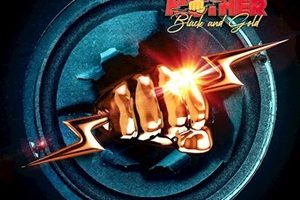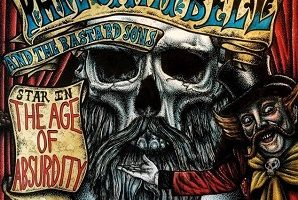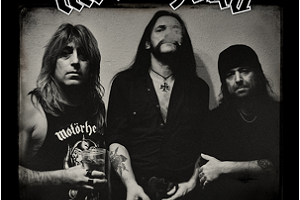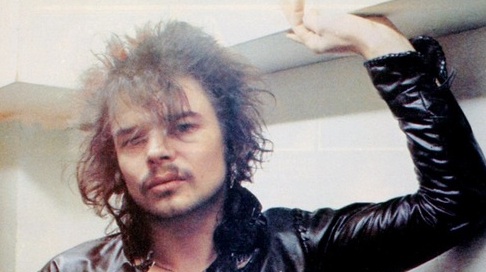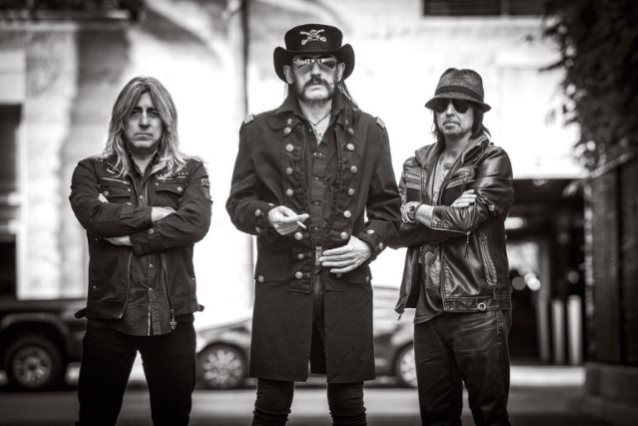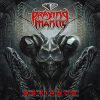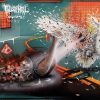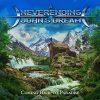Motorhead – Live and Loud
Sunday, 18th April 2021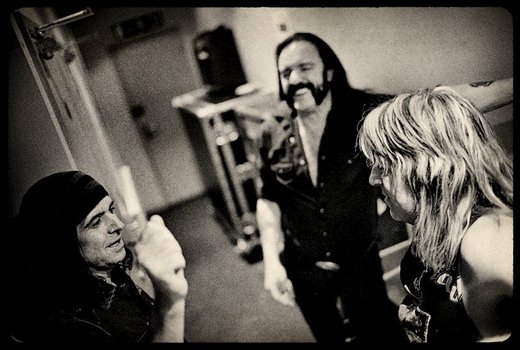
Even six years removed from legendary vocalist Lemmy Kilmister’s passing, Motorhead is still a name that is abuzz in the hard rock and heavy metal community. One of the first acts that come to mind when you think of heavy music, and they always will be. The band is about to release a new live album, Louder than Noise, captured in Germany in 2012 that again captures their energetic spirit. We were able to speak with drummer Mikkey Dee for a spell to discuss the release, what a proper live show should feel like, drumming technique in different bands, and much more.
Dead Rhetoric: What makes Louder than Noise stand out to you, as a live album from Motorhead?
Mikkey Dee: We recorded a lot of materials over the years. We went through a few shows, and this one has a lot of songs that we actually didn’t play after that period. I was very surprised to see the setlist in that we actually played a lot of these songs. I think there’s a good variety of song selection that we didn’t play in later years.
Dead Rhetoric: I know I’m pushing things with it now being like nine years since that particular concert, but is there anything you remember about that show in particular, or that touring cycle?
Dee: It was recorded in Germany – we recorded a lot of different things there over the years. We played this arena – it was the first time that we had stepped up to this size arena/stadium. It was a very special show for us. In Berlin, the Germans actually carried us through the years when a lot of promoters in other countries really didn’t promote much hard rock. This was the late ‘90s – there was a dip in hard rock music, especially in Europe. Why? I don’t know. But there were countries that no one really ever came around to play. France was one of them, unfortunately. We had a lot of great fans there, but promoters never brought us to France for years. We might do Paris, but that was it! In Germany, there was never a dip. They stood up for us. We had a great German promoter that brought us back every single year, and we brought something unique here. So it was quite natural that a lot of recordings were done in Germany. Every year we played there, we took one step ahead into bigger venues and selling more tickets. It was a natural build up in a way.
Dead Rhetoric: Given your time in a multitude of bands at this point, what is a live rock ‘n’ roll experience to you? What does it entail or require?
Dee: It should be some kind of out of body experience. What we were trying to do, and we do this with Scorpions too, is that we go out there and give 150% and want our fans to not dream away, but they should have two hours of pure entertainment. They should enjoy themselves to the fullest. That was the goal of Motorhead – just to entertain. Not to give any certain messages or have a hidden message – it was just to come and have a great time. We give it everything we have, every single night. There are no excuses. The show has to go on and it has to be a really good show. When you do that, truthfully, that rubs off on the audience as well.
Dead Rhetoric: For sure. It helps to just keep it entertaining. There’s nothing to throw people out of that experience, like you said, if you are just trying to provide entertainment from beginning to end.
Dee: That’s what we try to do. I usually compare it to a tennis ball. When I get on stage, I throw that tennis ball into the audience. If they throw it back it’s great! But I’m going to have to throw it back out there again. If we keep throwing that ball back and forth, that means that you are growing. That tennis ball sometimes gets thrown out there, but I don’t get it back…or vice versa! It’s just one of those shows. You cannot move forward. But most of the time, you get it back. You just keep raising it up – the expectations and the entertainment. Your energy goes up, their energy goes up and it keeps going back and forth.
Dead Rhetoric: I like that analogy, I haven’t heard that one before!
Dee: [Laughs] I think that one is my own, but that’s how I actually see it. That’s how I feel. You can’t throw your feelings out there, but you try to show the audience. It’s always the band that has to start. We go on stage and the audience is standing there/sitting there with great expectations, and we have to show that we mean business. We have to go out there and do everything. Once we have done that, they give us the reward by enjoying it. Then we have to raise it even higher up and take them to a climax, which is hard to do. It’s a constant volley – back and forth. I think it’s a good vision for people to understand how it’s done.
Dead Rhetoric: How important is it to do right by the Motorhead legacy when you release a live album like this?
Dee: As I said, we have a lot of great recordings through the years. We didn’t record everything live of course, because we did close to 5,000 shows just with me [laughs]. So not everything was recorded, but we did record quite a few. It feels great to just share another great Motorhead show. The material is in good condition, so it’s easy to work on and get a good sound. The vibe is there, we felt it, and we remember the show. So why not release it? There’s a demand out there for Motorhead still to this day. This is not to make money, because records don’t make money these days. A lot of people think that sometimes – what a nasty way to make money off of Motorhead when they don’t exist anymore or that Lemmy would be furious. But that’s not the case at all. We just want to share some more shows because we know there is a demand. We give them an option. You can buy it or not, it doesn’t matter. But we give it to you, so that if you want it you can get it.
Dead Rhetoric: I think that goes the same way with that incredible box set you put out last year.
Dee: You will always have skeptical people who don’t see through the whole thing. They think we are out to make money, which is absolutely false. We just want to continue. We just want to give our fans even more material and continue to keep the Motorhead name up there. Its incredible that a band that hasn’t existed in five years can still have headlines in big rock magazines.
Dead Rhetoric: Could you go into the thoughts of Motorhead as a family unit between the band, the crew, etc?
Dee: We were an extreme family, and still are. I have now joined another family in the Scorpions, which is great. I am actually quarantining in Germany right now. It’s the fifth day of walking around in my hotel room, and I can’t leave until tomorrow evening. I have been here for a week now. But with Motorhead, it was very special. All of that credit goes to Lemmy a little bit, because he had a certain way about him and the way he saw all of the machinery, if you will. Everything from the three or four of us to the truck driver or merch people that we didn’t see all the time. Whoever worked with the band in any way, shape, or form, and did a good job – they were pretty much hand-picked over the years. Every position had such a nice guy or girl, and they were loved by everyone.
We became a great family that way, and everyone looked out for each other all the time. That was very important for Lemmy, and for all of us of course, but the strongest was Lemmy. He was the man that held it together. He would not have any bullshit with a crew member treated badly, or having to have a shitty flight to save money. He demanded that the crew was equal to us, 100%. It was very awesome, and more people should learn from that. He had the greatest respect for all of us. Lemmy was the point man when it came to all of that.
Dead Rhetoric: A few years ago, you did these works of drum art. What was that process like to do a different take on drumming and turn it into a visual piece?
Dee: I thought it was a great thing. It was very different. I could do a press roll, and that got a certain character in the pictures. If I did a tom/snare roll or some other technique it would turn into a certain vision. It was pretty awesome actually. The artwork came out great! Unfortunately, we kind of shut it down because we didn’t have the best experience with the company that made it. I didn’t feel that they were professional enough to get my artwork out there in time. I had people buying my art, which was not very expensive, but they were waiting over a year to get their stuff! I said that we couldn’t work like that. I couldn’t be out there selling my artwork and people not getting it.
Dead Rhetoric: You also are a big hockey fan and played hockey. Is there a connection between sports and music?
Dee: I think music is extremely close to sports. I have a lot of friends who are professional athletes in a lot of different sports. In talking to these guys and girls, I see such a connection in how they think, how they prepare, and how the pressure…we have a lot in common. It’s pretty much the same thing I would say when it comes to many different angles. How they live their lives with competitions, having to stay in shape, and how they think before a game, or whatever. It’s the same thing.
Dead Rhetoric: Do you approach drumming differently based on the band – like the way you play in Motorhead vs King Diamond vs Scorpions?
Dee: Yes, absolutely. I have to really dig into myself big time to analyze what I am going to be doing. I don’t want to destroy the band by playing the wrong thing. If you take Motorhead for instance. It was really hard to play that type of music, not the physical part, but I could have easily gone into Motorhead in ‘91/’92, coming from King Diamond and Dokken, and I could have overplayed everything we did. Doing super cool drum beats and fills, and weird rhythms – but I would have destroyed Motorhead. I could have easily been sitting and playing straight over it. I compare this to being in a dark room, and I don’t know where I am going or what I am doing. I have to analyze every single song. What can I do here? How can I color a black and white picture so that it is still black and white, but it has some color here and there. The first impression is that it’s black & white and super hard. But it’s very important that I didn’t play it like Neil Peart playing a Rush song over a Motorhead tune. At the same time, I couldn’t play AC/DC on top of Motorhead. I wanted to put Mikkey Dee into Motorhead to color the songs without destroying the simplicity and the hardness of Motorhead.
The same thing goes for Scorpions now. I cannot come into the Scorpions and bang away like I did with Motorhead. I have to work with the dynamic part of playing drums. When Phil [Campbell] did a guitar solo in Motorhead, I had to be busier on the drums somehow – to fill up. We were only a three piece. In Scorpions, when Matthias [Jabs] or Rudolf [Schnenker] does a solo, I have to do the opposite. I have to stay on the beat and let them do the solo. It’s a completely different approach to the songs that I’m going to be playing. After a while, when you are comfortable with a song, you can start thinking about doing a typical Mikkey Dee drum solo here without destroying the song, or I can do a certain beat here to make it harder or more dynamic. That’s how I work. I think very carefully so that I don’t destroy Scorpions melodic hard rock and play fucking speed metal or what I approached Motorhead with. It’s completely different.
Dead Rhetoric: Do you feel that’s something you have honed more over the years, in understanding your own style and being able to apply it?
Dee: Absolutely. You can only move forward by playing, playing, and playing. Only routine can give you that gift. When you are young, you want to be the best drummer or musician in the world. You don’t really care much [laughs] what it does to the song. You want to show off and be good. Do this radical drum fill or this incredible beat, and it might just destroy the song. In King Diamond, I started to analyze – I would ask what the song is. This guitar riff is so heavy, so it’s a guitar riff song, so I better stay on this riff. Certain songs, I felt – wow, I can go crazy here because it’s a typical drum song. Or with this song, the melody is incredible with the vocals that I need to do this or this. Over the years you kind of learn how to adjust into whatever song you are going to be playing. When I did the Helloween album, Rabbits Don’t Come Easy, I had such a short time to do it, I had to talk to the guys and I had to ask them what the vision was for each song. I tried to create that on the drums. They could tell me if it was a crazy song and we want the feeling and vision to be chaos. So it would be a more hit-oriented song, and have to approach my drums to each track.
Dead Rhetoric: From your perspective, what do you see as the future of rock and metal music? Will we still see bands of a larger stature in the future?
Dee: Yes – there’s amazing young bands out there. Some kids are creating some fantastic music. It’s just different music. I just posted a fun thing on Instagram and it’s kind of true – it was Jimmy Page of Led Zeppelin standing and watching out from a window saying you could call us old as much as you want, but my generation wrote music that will never be done in the future. It’s totally correct, but the music in the future to go back to your question, is just different. It doesn’t mean its not as good, it is just very different. That’s a natural way of evolution. Kids today have a different way of approaching music. There’s different tools. They know so much more and we didn’t have the computers/internet/YouTube. How you record an album then versus now is night and day. It’s very natural that you are going to hear and listen to music that is equally good, but it’s just different. If you take jazz music in the ‘40s and then move into rock in the ‘50s, and then go into the ’60s and ‘70s, there was incredible music and songs being written. So I hope it continues like that. What I hear out there is stunning. The young generation is just smoking out there.
Dead Rhetoric: The Motorhead live album is out in April. Do you have any plans with the Scorpions this year as well?
Dee: Right now, we are finishing up a new album. I am in Germany in this quarantine and the album is so close to being finished. Hopefully it will be released this spring. Our plan was to do Vegas in May, but I don’t really know how it will turn out. We are definitely going to do a month residency in Vegas, but I don’t know if it will be before summer, after summer, or maybe the beginning of next year. But we are standing so ready to go back out there. We will come the second that we can. We will hit the road.












